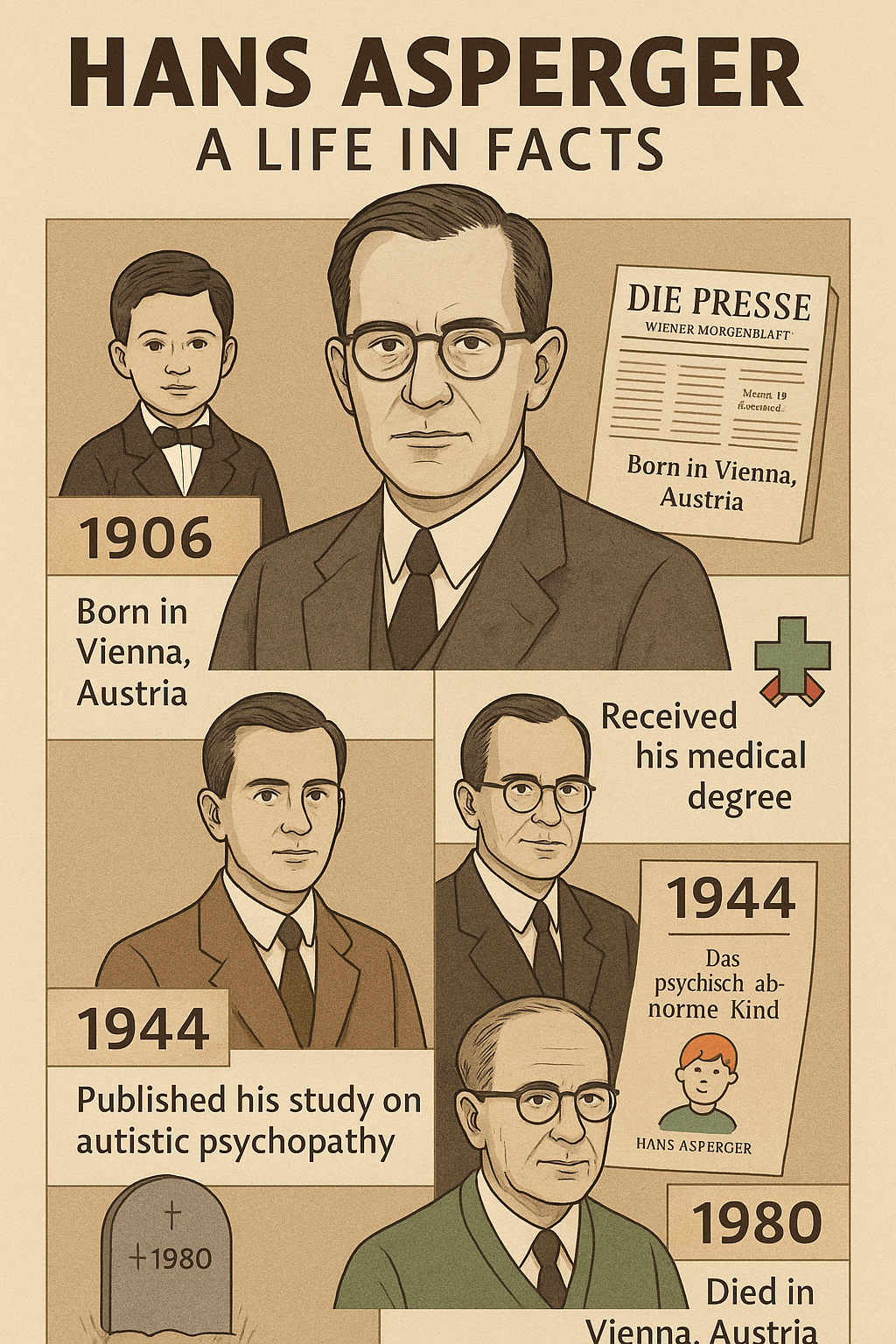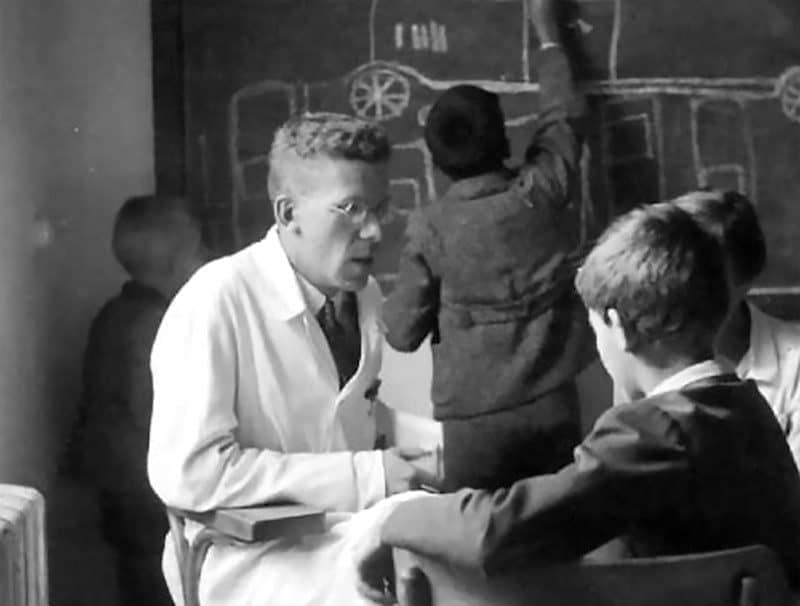
Hans Asperger is a pivotal figure in the history of autism research, best known for his groundbreaking work that led to the identification of what we now call Asperger syndrome. Understanding the facts about Hans Asperger’s life provides important context to both his scientific achievements and the ethical controversies surrounding his role during World War II. This article explores these facts in depth, shedding light on the man behind the diagnosis and his lasting impact on neurodiversity.
This article provides an in-depth look at facts about Hans Asperger’s life, tracing his journey from a young medical student in early 20th-century Austria to a figure whose work revolutionized our understanding of neurodiversity, while also addressing the ethical questions that have emerged from his wartime actions. Through this exploration, readers will gain a nuanced view of Asperger’s influence and the continuing debates surrounding his legacy.
Early Life and Academic Foundations
Hans Asperger was born on February 18, 1906, in the Austro-Hungarian Empire, a melting pot of cultures on the brink of monumental change. From an early age, Asperger displayed intellectual curiosity and a keen interest in human behavior. These traits guided him toward medical studies at the University of Vienna, where he specialized in pediatrics and child psychiatry, fields that were just beginning to gain recognition.
During his university years, Asperger was influenced by contemporary research on child development and psychology, which motivated him to focus on children who deviated from typical behavioral patterns. In a time when many neurodevelopmental conditions were misunderstood or misdiagnosed, Asperger’s attention to detail and compassionate approach allowed him to identify subtle differences in children who struggled socially but possessed average or superior intellectual abilities.
His early career involved extensive clinical observation and interaction with children in Vienna’s hospitals and clinics, where he developed his theories on what would later become known as Asperger syndrome. This period was critical in shaping his clinical approach, blending medical rigor with a humanistic understanding of his young patients.
Defining Asperger Syndrome: A Breakthrough in Autism Research
The defining moment of Asperger’s career came in 1944 when he published a detailed study on children who exhibited a unique set of behaviors. Unlike the more severely affected children described in classical autism, Asperger’s subjects were noted for:
-
Difficulties with social interaction and understanding social cues
-
Deep, narrow interests in specific subjects
-
Strong verbal skills and often advanced intellectual abilities
-
Clumsiness and awkward motor skills
Asperger referred to this pattern as “autistic psychopathy,” a term that emphasized the psychological nature of their social challenges. His careful documentation of these traits was revolutionary, revealing that autism was not a singular, uniform condition but a spectrum with varying manifestations.
Despite the significance of his findings, Asperger’s research remained relatively unknown outside the German-speaking world for decades. It wasn’t until the 1980s and 1990s, when English-speaking researchers rediscovered and translated his work, that Asperger syndrome gained widespread recognition. This led to its inclusion as a separate diagnosis in diagnostic manuals, helping countless individuals receive more accurate assessments and tailored support.
Wartime Controversies: Navigating a Dark Era
The story of Hans Asperger is incomplete without addressing the troubling questions about his actions during World War II. Asperger practiced medicine in Vienna at a time when the Nazi regime implemented horrific policies, including the systematic euthanasia of children with disabilities deemed “unfit” by the regime.
Recent scholarly investigations into archives have unveiled documents suggesting that Asperger’s relationship with the Nazi authorities was complicated. While he reportedly advocated for some children, protecting them from the euthanasia program, there is evidence that he may have referred others to these programs, or at least complied with Nazi policies to maintain his professional position.
This duality has sparked intense debate within the medical and historical communities. Asperger’s wartime conduct raises ethical questions about complicity, resistance, and survival under oppressive regimes. It also prompts reflection on how historical context influences the legacies of prominent figures in science and medicine.

Asperger Syndrome Today: From Diagnosis to Understanding
In modern clinical practice, Asperger syndrome is no longer classified as a separate disorder but has been incorporated into the broader diagnosis of Autism Spectrum Disorder (ASD) as outlined in the DSM-5, published in 2013. This reclassification reflects a contemporary understanding that autism exists along a continuum of symptoms and severities.
Nonetheless, Asperger’s original descriptions remain foundational in distinguishing individuals who have strong verbal and cognitive abilities but face specific social communication challenges. His work informs educational strategies, therapeutic interventions, and social supports that emphasize strengths while addressing difficulties.
Families and professionals today use these insights to create more inclusive environments and personalized care plans. Recognizing the diversity within the autism spectrum helps foster acceptance and empowerment for those with ASD.
Legacy and Ongoing Ethical Reflection
Hans Asperger’s legacy is a complex tapestry woven from scientific innovation and moral ambiguity. While his clinical contributions have had a lasting positive impact on autism awareness and diagnosis, the revelations about his conduct during Nazi rule invite critical examination and dialogue.
Organizations like the Autism Research Institute continue to build on Asperger’s work, promoting research, advocacy, and support for people with autism. At the same time, the historical reassessment of Asperger’s life serves as a reminder of the importance of ethical responsibility in science.
Understanding Asperger’s story encourages us to view historical figures in their full complexity and reminds us that scientific progress often unfolds within challenging human contexts.
FAQ: Essential Facts About Hans Asperger’s Life
Q1: Who was Hans Asperger?
Hans Asperger was an Austrian pediatrician best known for describing a form of autism characterized by social difficulties paired with strong verbal skills.
Q2: When did Asperger publish his key research?
His landmark paper was published in 1944, describing children with what came to be known as Asperger syndrome.
Q3: What controversies surround Asperger?
Archival research suggests he may have collaborated with Nazi policies during WWII, raising ethical concerns about his wartime role.
Q4: Is Asperger syndrome still diagnosed today?
The diagnosis has been absorbed into Autism Spectrum Disorder (ASD) in the current DSM-5 classification.
Q5: Where can I find reliable information on autism?
Trusted sources include the Autism Research Institute and the CDC’s autism resources.
Q6: How does Asperger’s work influence modern autism understanding?
His descriptions help identify individuals with unique social and cognitive profiles, informing tailored education and support.




